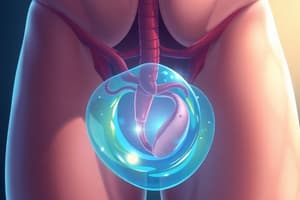Podcast
Questions and Answers
Which assessment finding is most consistent with a hydrocele?
Which assessment finding is most consistent with a hydrocele?
- Firm, painful mass fixed to the epididymis.
- Nontender, fluid-filled mass with positive transillumination. (correct)
- Worm-like mass that collapses when the patient is supine.
- Sudden onset of severe scrotal pain with absent cremasteric reflex.
A patient is diagnosed with a varicocele. Which statement best explains the typical location and potential complication of this condition?
A patient is diagnosed with a varicocele. Which statement best explains the typical location and potential complication of this condition?
- Usually on the left side due to backflow from the left renal vein, potentially contributing to infertility. (correct)
- Occurs bilaterally as a result of trauma, frequently resulting in acute scrotal pain.
- Located centrally due to lymphatic blockage, often causing chronic infection.
- Usually on the right side due to backflow from the right renal vein, commonly leading to urinary obstruction.
A young male presents with sudden, severe scrotal pain. Physical examination reveals an absent cremasteric reflex on the affected side. What condition is most likely?
A young male presents with sudden, severe scrotal pain. Physical examination reveals an absent cremasteric reflex on the affected side. What condition is most likely?
- Spermatocele
- Hydrocele
- Epididymitis
- Testicular Torsion (correct)
Which of the following conditions is considered a surgical emergency requiring immediate intervention?
Which of the following conditions is considered a surgical emergency requiring immediate intervention?
A patient is diagnosed with a spermatocele. They ask about the cause. What is the most appropriate response?
A patient is diagnosed with a spermatocele. They ask about the cause. What is the most appropriate response?
Why is surgical repair of hydroceles and spermatoceles avoided in men who may want to have more children?
Why is surgical repair of hydroceles and spermatoceles avoided in men who may want to have more children?
Which diagnostic test is most useful in confirming testicular torsion?
Which diagnostic test is most useful in confirming testicular torsion?
If blood flow is not restored within 4-6 hours from the onset of testicular torsion, what is the most likely outcome?
If blood flow is not restored within 4-6 hours from the onset of testicular torsion, what is the most likely outcome?
What is the typical presentation of a varicocele upon physical examination?
What is the typical presentation of a varicocele upon physical examination?
What is the purpose of transillumination in assessing scrotal abnormalities?
What is the purpose of transillumination in assessing scrotal abnormalities?
Flashcards
Hydrocele
Hydrocele
A nontender, fluid-filled mass in the scrotum due to lymphatic interference.
Transillumination
Transillumination
A diagnostic technique using light to identify fluid in the scrotum.
Spermatocele
Spermatocele
A firm, sperm-containing cyst of the epididymis that may appear with transillumination.
Varicocele
Varicocele
Signup and view all the flashcards
Infertility association
Infertility association
Signup and view all the flashcards
Testicular torsion
Testicular torsion
Signup and view all the flashcards
Cremasteric reflex
Cremasteric reflex
Signup and view all the flashcards
Emergency timeframe
Emergency timeframe
Signup and view all the flashcards
Doppler ultrasound
Doppler ultrasound
Signup and view all the flashcards
Surgical ligation
Surgical ligation
Signup and view all the flashcards
Study Notes
Hydrocele
- A hydrocele is a fluid-filled mass in the scrotum, caused by lymphatic drainage issues and swelling of the tunica vaginalis.
- Diagnosis involves transillumination (shining a light through the scrotum).
- Treatment is typically not needed unless the swelling is large and bothersome.
- Surgery is considered only if necessary, as it can lead to infertility.
Spermatocele
- A spermatocele is a firm, sperm-containing cyst in the epididymis.
- It may be visible with transillumination.
- The cause is unknown.
- Size fluctuations and pain are possible.
- Surgery is avoided in individuals who plan or have already started a family, due to potential infertility risks.
Varicocele
- A varicocele is a dilation of the veins draining the testes.
- Palpation may reveal a "worm-like" sensation in the scrotum.
- The cause is unknown.
- Most commonly occurs on the left side due to retrograde blood flow from the left renal vein.
- Varicoceles are linked to 40-50% of infertility cases, possibly due to sperm damage.
- Surgical repair may be considered for fertility concerns, with options like sclerosing agent injection or spermatic vein ligation.
Testicular Torsion
- Testicular torsion is a twisting of the spermatic cord, restricting blood flow to the testes and epididymis.
- It is a surgical emergency.
- Most prevalent in males under 20.
- Causes can be spontaneous, traumatic, or due to anatomical abnormalities.
- Symptoms include severe, sudden scrotal pain, tenderness, swelling, nausea, and vomiting.
- Pain is not relieved by rest or elevation.
- The cremasteric reflex is absent on the affected side.
- Tissue edema can mask normal anatomical landmarks.
- Diagnosis utilizes Doppler ultrasound to assess blood flow; decreased or absent flow confirms the diagnosis.
- Restoration of blood flow within 4-6 hours is crucial to prevent testicular necrosis.
- Immediate surgery to untwist the cord and restore blood supply is necessary if torsion does not resolve spontaneously.
Studying That Suits You
Use AI to generate personalized quizzes and flashcards to suit your learning preferences.




